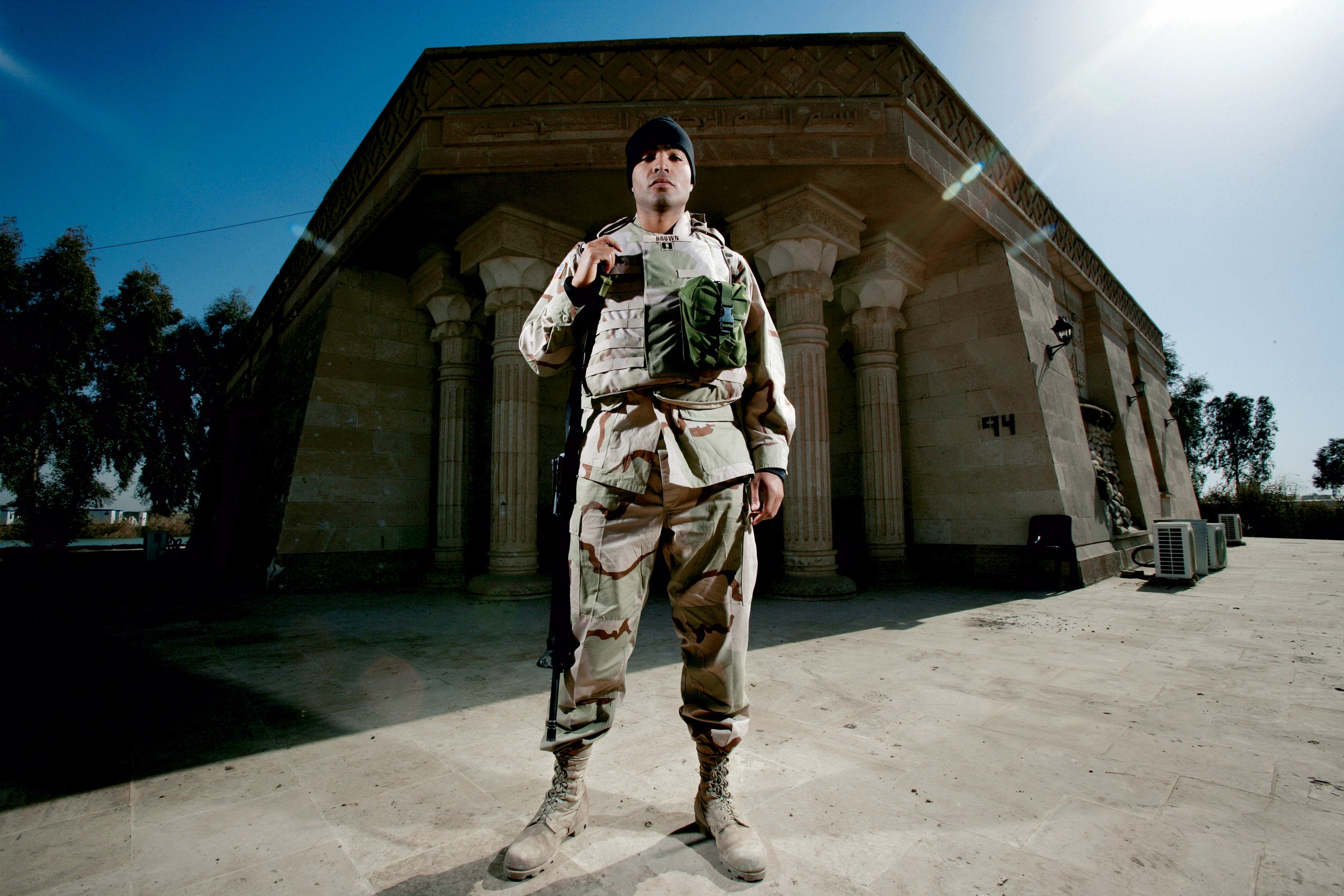My public service
Like many of my former classmates from Harvard Law School, when I head to work in the morning, I gather everything I need to bring to the office. I pack up my laptop, my case documents and then shuffle together any other work I may have taken home. These days, however, I also make sure to grab my M16A2 assault rifle, bulletproof flak vest and ballistic helmet. I then say a quick prayer … with the hope that my fellow soldiers and I don’t get bombed today.
I am a captain in the U.S. Army JAG Corps, supporting the 3rd Infantry Division in the Trial Defense Services field office in Camp Liberty, Iraq. I work as a criminal defense attorney for the young men and women serving as part of Operation Iraqi Freedom III. If I do my job well, my clients return to doing their jobs, namely, being soldiers, which is perhaps the toughest job any American may have today.
Many HLS alums may remember me from my participation in the CBS reality television show “Survivor: The Australian Outback.” Today, it is the survival of my clients that worries me the most. I worry because they patrol the dangerous streets of Baghdad, on constant watch for an enemy attack. I worry because I can see the stresses of war on their faces when they come into my office looking for help. They are serving in a war where defining the enemy is a difficult task. Knowing when, where and how the next attack will come is impossible. Many of the soldiers I represent are just barely out of high school, but they have been shot at, they’ve ridden in vehicles hit by explosive devices and they’ve witnessed firsthand the devastating realities of war.
Judge advocates are everywhere in the Middle East. Today there are more than 200 JAG attorneys in the Army in Iraq and Afghanistan, providing a full range of legal services. I practice only criminal defense, but attorneys here advise commanders on operational law, help soldiers navigate family law issues such as divorces and custody battles, assist local residents with claims for money, even prepare tax returns. The reality is that modern wars cannot be waged without a host of attorneys supporting the mission.
As a defense attorney, I represent soldiers accused of committing a wide array of crimes. Most offenses are minor, typically involving the use and distribution of illegal drugs or alcohol. Both are strictly prohibited in a combat zone but can be easily obtained. I believe some soldiers get involved with drugs and alcohol as a way to deal with the anxieties of serving in a deployed environment. Others are simply too young or immature to consider the consequences. My colleagues and I also represent soldiers accused of more serious offenses, including theft, sexual assault and murder. I manage cases from beginning to end, from the initial client meeting to the completion of the soldier’s court-martial.
In my time here, I’ve seen that the morale of soldiers varies tremendously. Most of my interaction with them, of course, is not in the best of circumstances, and their morale reflects their position. In general, however, I believe morale is good.
Practicing law in a combat zone is unlike anything I have ever experienced. In my work for the JAG Corps in the United States, it was easy to focus almost solely on case strategy and preparation. I could meet with my clients and witnesses just about as frequently as I wanted. I could easily drive to crime scenes, walk across the street to negotiate with prosecutors and accomplish any administrative task. Nothing is that simple in a combat zone. Many of the soldiers I defend are based throughout the greater Baghdad region. I often have to schedule rides on Blackhawk helicopters to outlying bases in order to meet with my clients. More frequently, either the soldier or I must convoy through the city in order to simply meet and discuss a case. Being on the city streets, you simply cannot know if the next Humvee hit by a rocket, roadside bomb or hand grenade dropped from a bridge will be yours. Every time I step outside the gates of relatively safe Camp Liberty, I bring along six or seven magazines fully loaded with ammunition. Sometimes it’s difficult for me to comprehend that a whole team of soldiers must convoy across the city simply so one soldier can seek my legal advice. Quite often, the soldier driving us is barely 19 and the one protecting us from behind the .50-caliber machine gun isn’t any older. All of this is to make sure that criminal justice functions.
Although practicing law here is tough both professionally and personally, I am cherishing my time in Iraq. This is my generation’s war. For better or for worse, for the soldiers on the ground, this is our Vietnam. Politics aside, it is fascinating to be a part of history. My colleagues and I flew into Baghdad just days prior to Iraq’s first democratic election. One of the courtrooms we use for our courts-martial is the room in which Saddam Hussein was initially arraigned. Sitting in my office, I sometimes feel isolated from the day-to-day happenings of life in Baghdad, but I recognize that history is being written around me every day. More important, I truly enjoy what I do for a living. The soldiers I represent are America’s youth. They have agreed to put their lives on the line to fight in Iraq. I see it as an opportunity to help them get their lives back on track. My public service is defending those who defend America.
Brown arrived in Baghdad in January and expects to be stationed in Iraq through February 2006.
